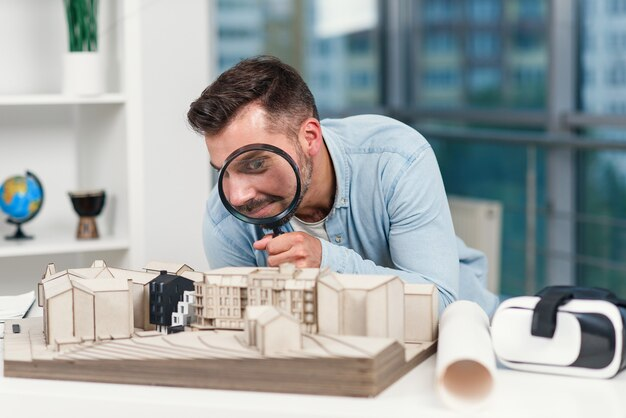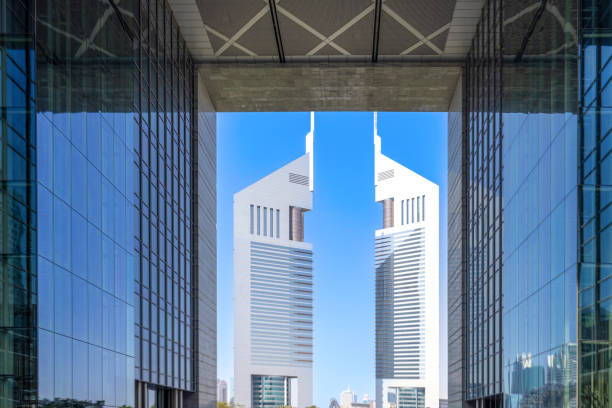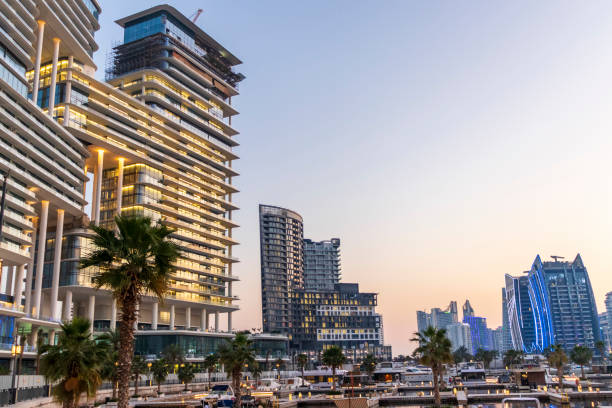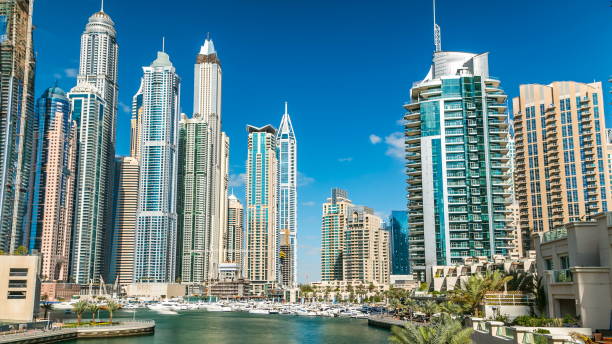Dubai is renowned not just for its glittering skyscrapers and opulent lifestyle but also for its forward-thinking real estate market. When buying property in this cosmopolitan hub, it’s crucial to understand the nuances. The real estate landscape in Dubai is a blend of luxury and innovation, catering to a diverse range of buyers with different needs, including those who wish to buy an apartment in Dubai on installments, allowing for financial flexibility. The legal framework is unique, as it offers provisions for expatriate ownership that you might not find in other parts of the Middle East. This appealing market framework has made Dubai a hotspot for international investors and those seeking a second home in a dynamic urban setting.
Types of Properties Available in Dubai
- Residential Options
- Commercial Real Estate Opportunities
Residential Options
In Dubai are as varied as the city’s skyline. From opulent villas on Palm Jumeirah to sleek apartments in Downtown Dubai, there’s a dwelling to suit any lifestyle. High-rise units with stunning views are sought after, as are more suburban settings in planned communities like Arabian Ranches. Whether you’re a bachelor looking for a studio or a family in need of a spacious home, the market has an ample selection. It’s this diversity that often prompts the question from prospective international buyers: “”Can foreigners buy property in Dubai?”” The answer is affirmative, with the government encouraging foreign investment through various buyer-friendly policies.
Commercial Real Estate Opportunities
On the front, Dubai offers a host of options for businesses and investors. Office spaces, retail units, and even entire buildings can be part of your portfolio. The commercial sector thrives on Dubai’s global connectivity and business-friendly climate, making it a smart choice for long-term investment.

Key Considerations Before Making a Purchase
Before diving into Dubai’s property waters, it’s necessary to do some financial deep-sea diving. Budgeting and Financial Planning are the bedrock of a sound investment. Calculate the total cost, which is not just the price of the property but also includes additional fees such as registration, agent’s fee, and ongoing maintenance expenses. Dubai is full of tantalizing prospects, but stretching beyond your means could lead to a perilous drop off the fiscal cliff.
Understanding Location Analysis is paramount. Location dictates convenience, connectivity, and ultimately, property value. Enumerate the pros and cons of various neighborhoods, considering factors like proximity to workplaces, schools, and entertainment options. An investment that may seem financially sound but is poorly located may not yield expected dividends.
In tandem with location is Property Valuation and Price Trends. Analyzing historical price data and understanding current market trends can offer a birds-eye view of the investment landscape. This perspective aids in gauging whether the property’s asking price aligns with market reality and facilitates a well-informed negotiation process.
The Buying Process Explained
The journey to acquiring property in Dubai begins with a thorough search. Finding the Right Property might involve considering options that allow you to buy property on incremental payments, which has become an attractive avenue for many, simplifying the usually significant financial outlay. Research is mission-critical, involving countless property portals, classified ads, and often, a gauntlet of showings.
After pinpointing the dream property, Securing Financing is the next hurdle. For non-cash buyers, mortgage availability comes into play, and it’s vital to scour the market comprehensively. Interest rates, loan-to-value ratios, and repayment terms must be scrutinized to avoid a financial misstep. Understanding the pre-approval process can expedite the purchase once the right property is found.
The subtleties of the Property Transfer Procedure in Dubai may seem daunting, but they are crucial for a transparent transaction. From initial deposit to final transfer, each stage is governed by regulations to protect both buyer and seller. Working with a lawyer experienced in Dubai property law can make this a smooth sail rather than a choppy ride.
| Stage | Action Required |
|---|---|
| Initial Offer | Negotiation and agreement on terms |
| Agreement | Signing of the Memorandum of Understanding (MoU) |
| Pre-Approval | Arrangement of financing, if necessary |
| Due Diligence | Ensuring documents and permissions are in order |
| Final Transfer | Settlement of payments and transfer of ownership deed |
Navigating through these stages with precision ensures that the dream of owning property in Dubai doesn’t turn into a desert mirage. Buying property in Dubai for foreigners has been simplified over the years; however, understanding these procedures is imperative. The question is not just “”Can a foreigner buy property in Dubai?”” but also “”How can a foreigner buy property in Dubai?”” The answer to both reveals Dubai’s position as a leading, investor-friendly real estate market—welcoming buyers from across the globe with a streamlined and efficient property purchase system.
Ownership Policies for Expatriates
The legalities surrounding expatriate ownership in Dubai can appear complex, but understanding the differences between Freehold vs. Leasehold areas is key. In freehold regions, expatriates can own property outright, including the land it sits on. Conversely, in leasehold areas, you have the right to use the property for a period ranging from 30 to 99 years. This distinction is critical, as it influences your long-term investment strategy and the scope of your ownership rights. Can foreigners buy property in Dubai? This is a frequent query, especially when considering ownership limitations in other Middle Eastern countries. Fortuitously, Dubai provides more inclusive policies for international buyers.
Ownership Rights and Restrictions vary significantly depending on the developer and the project. It’s essential for potential purchasers to grasp their rights fully, such as the ability to sell the property, lease it out, or make alterations. Understanding any restrictions that might apply to the property, especially in certain zones or developments, will avoid legal complications down the line.

The Importance of Due Diligence
The allure of prime property deals can be overwhelming, yet due diligence remains the cornerstone of every wise property transaction. Checking Developer Credentials means investigating the developer’s reputation, past projects, and financial stability. Reliable developers have a history of delivering quality construction and adhering to their promises, while less scrupulous ones could put your investment at risk.
Inspecting the Property is not just about admiring aesthetics but also assessing structural quality and finishes. Pre-handover insp ections can prevent future disputes and ensure that the property meets your expectations. Moreover, take time to visit the area during different times of the day to understand traffic patterns and neighborhood dynamics.
Reviewing Property Documentation is a process that should not be overlooked. This involves scrutinizing the title deed, sales agreement, and developer’s NOC (No Objection Certificate). These documents confirm the legal status of the property and certify that there are no outstanding disputes or mortgages that could jeopardize your ownership.
The Role of Real Estate Agents in Dubai
- Choosing a Reputable Agent
- Agents’ Responsibilities to Buyers
Choosing a Reputable Agent
Requires diligent research. Look for agents with a solid track record, positive client testimonials, and relevant industry credentials. A good agent can offer access to unlisted properties and may leverage their network to ensure you get the best deal possible.
Agents’ Responsibilities to Buyers
Include disclosing any potential conflicts of interest, negotiating on behalf of the client, and offering reliable advice. They should act with the buyer’s best interests in mind throughout the property search, negotiation, and finalization of the sale.
Long-Term Value of Property Investment in Dubai
The Market Stability and Growth Projections contribute significantly to Dubai’s attractiveness as an investment destination. With Expo 2020 having shone a spotlight on the city and projects like the Dubai Vision 2040, the real estate landscape is poised for sustained growth.
Rental Yields and Resale Value are fundamental considerations for investors. Dubai properties often offer higher rental yields compared to many major cities around the world, turning them into profitable ventures over time. The resale value also benefits from the city’s incessant development and international appeal.

Common Pitfalls to Avoid
- Investment Scams
- Overestimating Rental Income and Value Appreciation
Living in Dubai: Post-Purchase Considerations
For those considering relocation alongside their purchase, Understanding Cultural Norms in Dubai is important for a harmonious living experience. Embracing local customs and legislation will facilitate a smoother transition into the vibrant community life Dubai offers.
Access to Amenities and Services remains a priority for most homeowners. Post-purchase, ensure your property’s easy access to schools, hospitals, shopping centers, and transportation hubs to maximize convenience and quality of life.
Conclusion: Making an Informed Decision
Buying property in Dubai can be a rewarding venture provided you approach it with due diligence, a clear understanding of the legal framework, and sensible financial planning. The city’s welcoming approach to foreign investment, coupled with its dynamic real estate market, makes it a prime location for property investors and home buyers alike.
FAQs
Q1: Can foreigners legally own property in freehold areas of Dubai?
A1: Yes, foreigners can legally own freehold property in designated areas of Dubai, which includes full ownership of the property and the land on which it stands.
Q2: What kind of properties can Expatriates buy in Dubai?
A2: Expatriates can purchase a variety of properties in Dubai, including apartments, villas, townhouses, and even office spaces, both in freehold and leasehold areas.
Q3: What should I consider before hiring a real estate agent in Dubai?
A3: Before hiring a real estate agent in Dubai, consider their experience, local market knowledge, client testimonials, and whether they have a valid license from the Dubai Land Department.
Q4: How do rental yields in Dubai compare to other major cities?
A4: Dubai’s rental yields are often higher than those in other major global cities, making it an attractive destination for property investors seeking regular income.
Q5: What are some common misconceptions about buying property in Dubai that I should be aware of?
A5: Common misconceptions include the idea that foreigners can’t own property outright (they can in freehold areas), that the buying process is overly complicated (it’s straightforward with due diligence), and that only luxury properties are available (there’s a diverse range of properties to suit various budgets).



